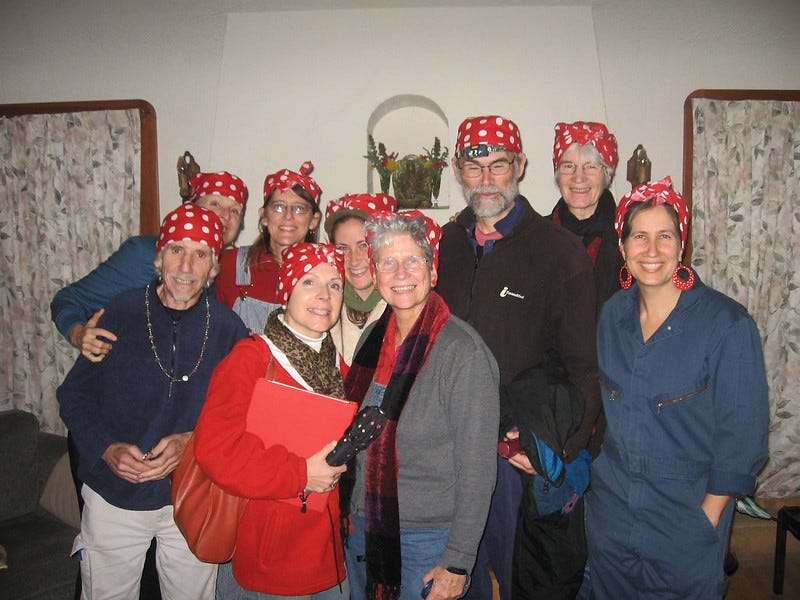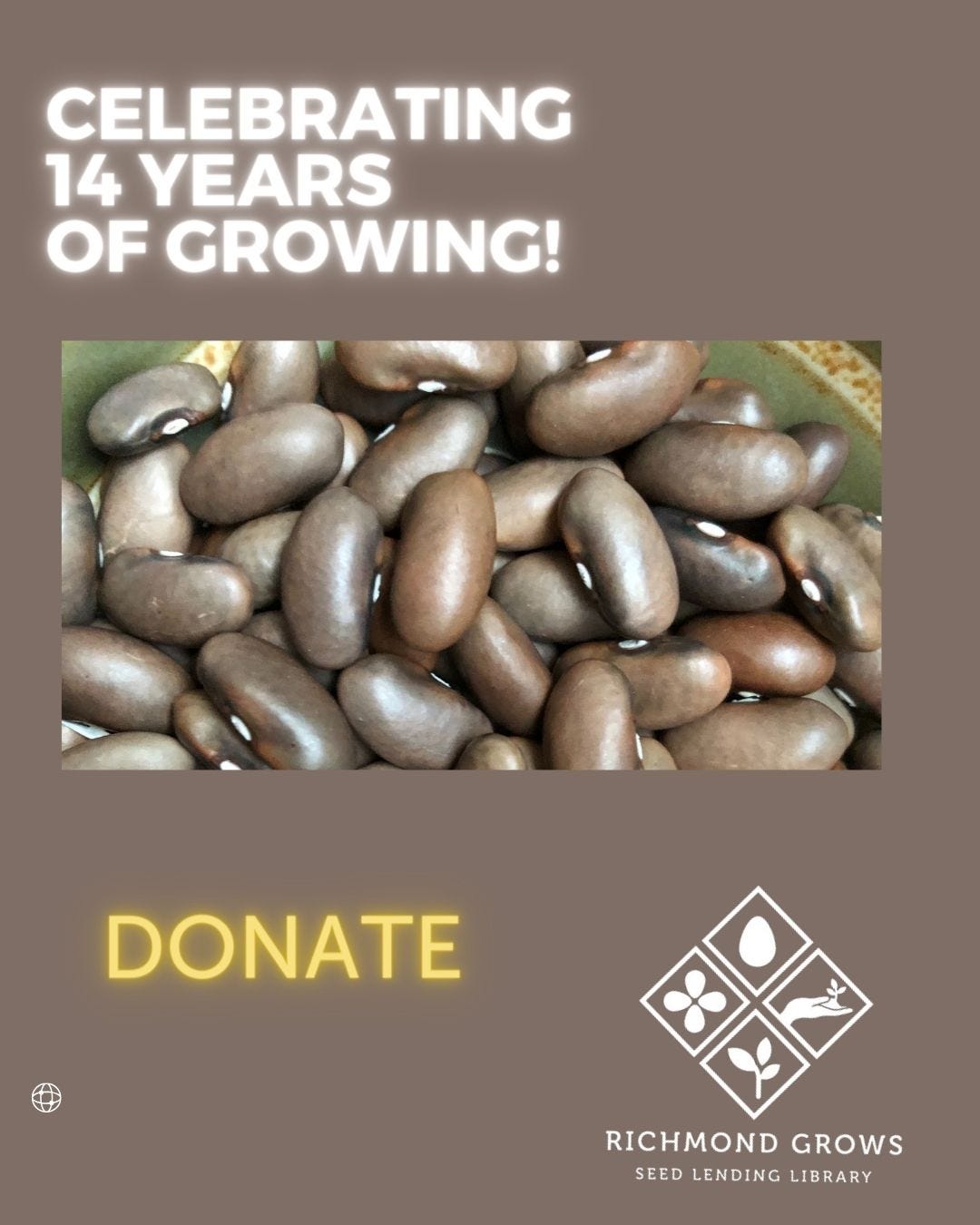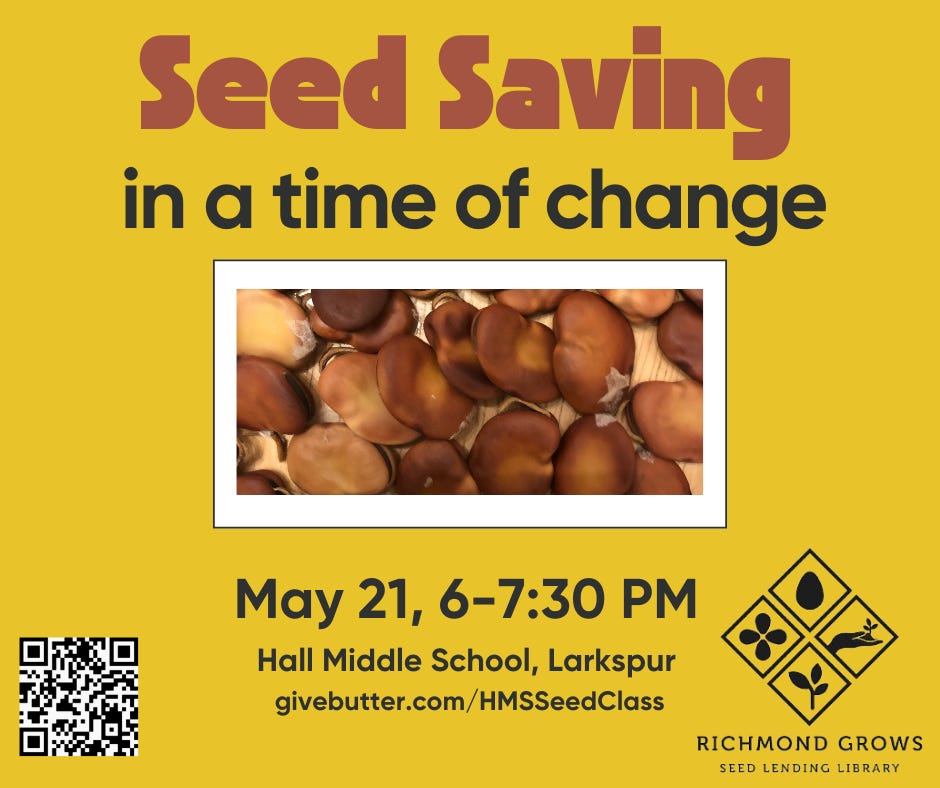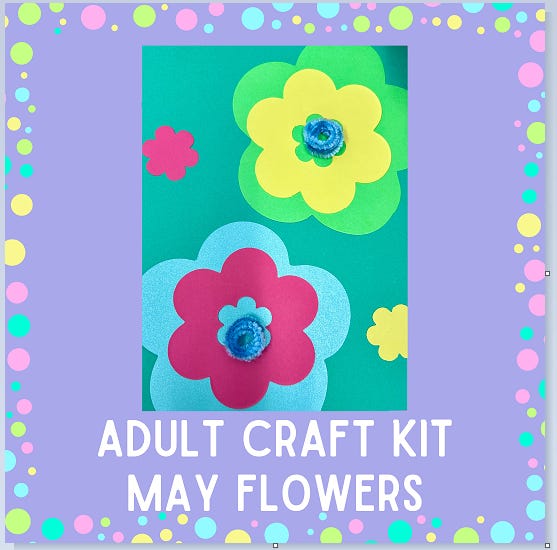In late 2009, the concept of the Richmond Grows Seed Lending Library took root during my permaculture design class. Contemplating my role in fostering sustainability and improving our world, the question "What is mine to do?" echoed in my mind. Suddenly, the word "Seeds!" reverberated through my body. I knew in an instant that I wanted to create a seed library like the one that existed in the Berkeley Ecology Center, BASIL (Bay Area Seed Interchange Library), and create it as a replicable model so that any community that wanted to share seeds could easily open one. The idea was as thrilling as it was daunting since I knew very little about seed saving.
Fortunately, my permaculture design teacher was Christopher Shein, one of the people who founded BASIL. I explained to him what I wanted to do and said that I would be happy to organize their seed library and then use that information to create one in my public library with the idea of creating a replicable model.
A new friend from my permaculture class, Trish Clifford, was organizing the Richmond Rivets Transition Town, a group committed to helping our community break the addiction to fossil fuels and live more sustainably. While the group was still in the initial phases of forming, I proposed making the seed library a flagship project for the Rivets.
I reached out to a librarian whom I knew at the Richmond Public Library. A few months later I contacted her again because the urge to move on this was unavoidable. After no response to several emails, I went down after work. When I bumped into her, she said that three of the 6 librarians had been given early retirement slips and this was her last day. However, despite the reduction in staff, I couldn’t deny the impulse and met with the interim library director. The idea of a seed library was relatively unknown, as only 5 existed at that time. Fortunately, he was excited about the idea of bringing more people into the library at the cost of providing a few square feet of real estate.
The next month a convergence of BASIL people happened that allowed me to meet with the originators and those who had kept it going for 10 years. Sascha DuBrul, the project's originator, wasn’t there for its 2000 opening, having already moved to New York. However, he was coming back to the Bay Area for a couple of months just as the idea was growing in me. Terri Compost, who had kept BASIL going through fertile and fallow years, would be moving to Washington shortly. Anders Vidstrand, the propagation specialist at Merritt College where Christopher was teaching, was leaving to take an academic position back east. I was able to pull us all together to re-organize BASIL. We envisioned a system where borrowers grasped the importance of returning seeds. To encourage this, and simultaneously embed educational aspects - something important to me as a middle school science teacher - we opted to organize seeds based on plant families. For example, beans and peas are in the same family and have similar seed saving requirements. They are also “super easy” to save because they are extremely self-pollinating and the return will be true-to-type. In other words, the seeds harvested will produce plants like the parent plant.
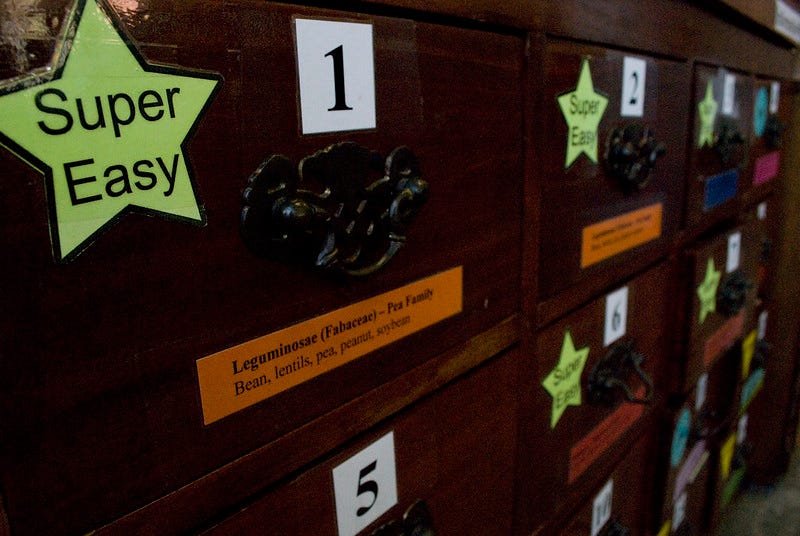
Catalin Kaser, one of my dear friends, was my primary thinking buddy, and helped enormously as we created the structure and initial resources. I asked if she would help me co-create the seed library and she agreed to help launch it. We spent a few months writing brochures, creating organizational material, and writing to seed companies for donations. On May 1, 2010, Richmond Grows officially opened its doors, marking the beginning of our journey. We held an orientation session to guide individuals on utilizing the library's resources and borrowing seeds. During our first orientation, an elderly gentleman arrived accompanied by his caretaker to contribute a packet of clarkia seeds. He had nurtured these seeds in El Cerrito for over three decades. It was a poignant and memorable occasion, marking our first donation to the library.
At the end of May 2010, we hosted our first seed swap (how to host a seed swap). The next month we were notified that we had won the East Bay Express’ Best Seed Lending Library Award, which made me both laugh and smile as there were only two seed libraries in the East Bay at that time. (Now there are 40!) Someone had obviously written that category in and the editorial staff approved it. With that small acknowledgement, a seed was planted. The interim director at the Richmond Public Library wrote a press release and the requests for interviews started to come in from the San Francisco Chronicle to the American Public Library Journal.
Individuals from several towns started to show up at our orientations with the intention to launch similar projects, such as Green Thumbs/Green Minds in Alameda and Hayes Valley Farm Seed Lending Library. Between their requests and the increase in media, I added resources on how to create a seed library on our newly launched website. I also started to track seed libraries that were opening up.
In July, we became a fiscally sponsored project of Urban Tilth and I also attended the Going to Seed Tour at the Berkeley Ecology Center, where Bill McDorman and Belle Starr emphasized the importance of saving seeds. Bill's question, "What are you doing now that has any relevance to 1000 years from now?" spurred me to enroll in their Seed School in Arizona. Sharing my idea with Bill of a replicable model for seed libraries, it gained traction during his tour. In October, several attendees at Seed School were keen to start their own libraries. During my time in Arizona, I received a call from the New York Times, expressing interest in writing about seed libraries. Our seed library had been open barely 6 months and the idea was quickly being planted in other communities. I was so grateful for Terri Compost who had nurtured BASIL for years until the soil was ready for the idea to germinate.
Shortly after my return from Seed School, I developed our Seed Saving Class and we hosted our first class at the public library.
In December, with over 15 seed libraries now established and many more in the works, we took a moment to reflect on the year's achievements. It was time for celebration. The Richmond Rivets gathered for an evening filled with creatively repurposed carols. Looking back on the year, we were eager to continue to plant seeds and ideas.
Hark the soil is beckoning
Let’s all garden in the spring,
You can borrow seeds for free
At the Richmond Library.
Sung to “Hark the Herald Angels Sing”
We are celebrating our 14th Anniversary on May 1st!
WE NEED YOUR FINANCIAL SUPPORT!
We’re a 100% volunteer-run, community supported project… and we’re almost out of envelopes 💌 !
During the first year of the pandemic, our seeds were locked in the public library and we bought seeds to meet the need and gave out 20K seed packets in 2020 and 13K in 2021 through 15 neighborhood seed libraries. The continued high demand has wiped out our funds completely! But you can help!
$10 provides 200 seed packets!
$20.24 uplift our vision for 2024.
$50 provides a whopping 1000 seed packets!
Here are some ways your tax deductible donation will help:
Provide seed envelopes (every seed packet costs 5 cents)… Did I mention we’re almost out of envelopes?!
Website hosting
Translating website and resources into multiple languages to increase access
Promote pop-up seed libraries hosting cultural collections
Here’s just a few things we’ve grown in 14 years!
🥕 Shared tens of thousands of seed packets in our community
🌱 Donated surplus seeds to other East Bay seed libraries
🌼 Developed “Create a Library” resources to help hundreds of seed libraries around the globe blossom
🫶 Created East Bay Local Seeds to support local seed libraries - there are now 40!
🫛 Co-hosted the East Bay Collaborative Seed Project to develop locally adapted, nutrient-dense seeds
🌿 Hosted annual Seed Library Summits to inspire and sow new ideas - last one had 2,200 participants from 35 countries
We’d love to hear your stories of how you’ve connected with Richmond Grows Seed Lending Library or how the resources we have created have helped you launch your own seed library in your community. Leave us a comment!
Seed Saving in a Time of Change Class
Do you rely on getting seeds or starts from a nursery? Are the seeds you are planting adapting to our changing climate and to your preferences? Learn the ancient practice of saving seeds.
Over 94% of the seed commercially available 100 years ago is gone. The loss of genetic diversity and the current model of breeding for uniformity makes our food system much more susceptible to shocks from pests and diseases to severe weather events due to climate change. This class focuses on food crops and will be held on May 21st, 6-7:30 PM at Hall Middle School in Larkspur. Register. Help create a local seed shed in our community and be part of the solution.
Instructor: Rebecca Newburn is a prominent advocate for seed conservation and community engagement, having played a pivotal role in the growth and popularization of seed libraries. Co-founder of the Richmond Grows Seed Lending Library and Founder of the Seed Library Network, Rebecca has been instrumental in creating a resilient and replicable model for seed libraries across the globe. Through her initiatives, she's championed the importance of preserving plant biodiversity, promoting sustainable agricultural practices, and fostering community collaboration. She is a science teacher at Hall Middle School and a group of her former 6th graders created the Hall Middle School Seed Lending Library.
What will you save?
Lettuce Unite! ✊🏾🥬
The Lettuce Unite! ✊🏾🥬 Newsletter will be published quarterly on the solstice and equinox. This is a special edition celebrating our anniversary. Our newsletter will be expanding to uplift seed libraries throughout the San Francisco Bay Area of California.
Richmond Grows Seed Lending Library sits within the territory of xučyun (Huichin), the ancestral and unceded land of the Huichin, an Ohlone people, what is colonially known as the East Bay of San Francisco. If you live in the East Bay, consider paying the Sogorea Te' Land Trust Shuumi Land Tax to support the rematriation of indigenous people.
Richmond Public Library News
The May Adult Craft Kit will be a paper craft making flowers. The kit also announces The Seed Library. You can pick up kits at the reference desk at the main branch, 325 Civic Center Plaza. Drop by the seed library while you’re there.





